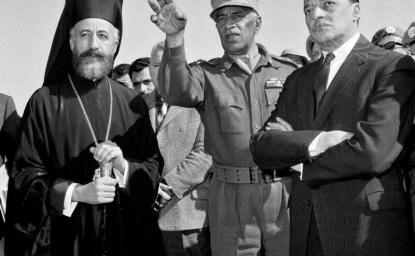CALL FOR PAPERS
International Conference
East-Central Europe in the Cold War, 1945–1989
Warsaw, 16–18 October 2008
For almost half a century the Cold War conflict shaped international relations and to a large extent influenced the history of individual nations. The Cold War was a global conflict, but in a particular manner was also a European conflict. The beginning and end of the Cold War (at least the beginning of its end) took place in Central Europe. For several dozen years Europeans on either side of the Iron Curtain prepared themselves for a potential apocalyptic conflict, or sought to prevent one from occurring. These preparations and preventative measures, to a hitherto insufficiently recognized degree, influenced their histories.
Thanks to the ‘archival revolution', which began in the 1990s in the wake of the opening of communist-era archives, our knowledge about the Cold War, and its influence on the countries of East-Central Europe and their roles in this conflict in particular, has greatly increased. Numerous topics, once the domain of pure speculation, can today be presented as grounded in primary sources. The aim of the conference is to present the newest studies and enable discussion among leading specialists from different countries.
The conference organizers
– The Institute of National Remembrance, - The Institute of Political Studies of the Polish Academy of Sciences acting as a member of the EurhistXX network,
- The Cold War International History Project of the Woodrow Wilson International Center for Scholars in Washington DC
would like to sincerely call for the submission of paper proposals.
The conference languages will be English and Polish with consecutive interpretation provided. The conference program will include seven thematic sessions:
1. Activities of European Soviet Bloc countries towards the West during the Cold War – for example: diplomatic and intelligence activities, propaganda (directed at their own societies and towards the West), mobilization of society and psychological warfare, support for western European communist groups, pacifist movements, anti-US attitudes and European integration, support for terrorist groups, preparation for acts of sabotage in the event of conflict (5-6 papers).
2. Western European countries towards East-Central Europe during the Cold War – for example: propaganda (directed towards their own societies and to the East), mobilization of society and psychological warfare, utilization of émigrés from East-Central Europe, policy of differentiation and ‘softening' strategies, attitudes towards dissidents and opposition movements, reactions to crises in the Communist Bloc, intelligence operations (5-6 papers).
3. Rifts between the European countries of the Communist Bloc and their exploitation by the West – for example: the Stalin – Tito conflict and attitudes of the Bloc countries towards Yugoslavia, conflict with Albania, Romania's independent policies, the Prague Spring, variations in the rhythm of changes as a source of mutual distrust, local conflicts, Communist Bloc countries' attitudes towards Solidarity and Perestroika (4 papers).
4. Countries of East-Central Europe and the Sino-Soviet conflict and other Communist Bloc tensions – for example: efforts to exploit conflict, mediation efforts, conferences organized by Moscow (4 papers).
5. The role of East-Central Europe in Soviet policy towards the Third World – for example: intelligence activities, support for ‘national liberation' movements and communist groups, economic and military aid, advisors, training, propaganda (5-6 papers).
6. Military aspects of the Cold War – the role of East-Central European countries in the Warsaw Pact and their place in the military plans of the East and West – for example: similarities and differences in the degree of potential engagement of individual armies, nuclear arms in East-Central Europe, scope of economic strain, armament industry and its infrastructure, militarization of society (5-6 papers).
7. Demobilization in Europe after the Cold War - military, economic, political and cultural. This final session will deal with various aspects of demobilization in Western and Eastern Europe following the end of the Cold War, an major consequences of the demobilizations for international and domestic politics of European countries (5 papers). The session is co-sponsored by EurhistXX.
We invite all those interested to participate in the conference – both as speakers and as participants in the discussion. Conference organizers will cover the costs of paper authors – room and board and refund travel expenses (up to 400 Euro for speakers from Europe and up to 1000 Euro for those outside Europe).
Potential speakers are requested to register (with the questionnaire, below) before 15 April 2008. Speakers are requested to additionally include with their questionnaire an abstract of their paper (max. 500 words) in English or Polish.
The conference will be open to the public. There is no mandatory conference fee. However, those registered participants who choose to pay a 200 PLN (55 EUR) conference fee will receive an invitation to a formal dinner, 3 mid-day meals and full conference materials. Instructions regarding the payment of the conference fee will follow at a later date.
Please e-mail your registration form to:
anna.piekarska@ipn.gov.pl
or send it to the following address:
Ms. Anna Piekarska
Instytut Pamieci Narodowej
Biuro Edukacji Publicznej
ul. Towarowa 28
00-839 Warszawa, Poland
"Conference 2008"
fax: +48.22.431.83.80
For additional information, contact:
Anna Piekarska – anna.piekarska@ipn.gov.pl or visit
http://www.ipn.gov.pl

Cold War International History Project
The Cold War International History Project supports the full and prompt release of historical materials by governments on all sides of the Cold War. Read more




